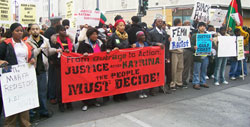March on New Orleans: ‘We shall not be moved’
By
LeiLani Dowell
New Orleans
Published Dec 15, 2005 1:50 AM
|
Evacuees and their supporters lead off march
through the streets of New Orleans Dec. 10.
|
The streets of New
Orleans were filled with angry and determined protesters, both survivors of
Hurricane Katrina and their supporters, on Dec. 10, International Human Rights
Day. Chanting “We’re back to take it back” and “No
justice, no peace!” a crowd estimated at 5,000 marched from the historic
Congo Square—also known as Louis Armstrong Park and described by Reuters
as “a centuries-old meeting place where African slaves once gathered to
trade, play music and dance”—to City Hall for a rally, where they
demanded “Justice after Katrina.”
The march was a vibrant
display of the culture and resistance of the people of New Orleans. Babies were
pushed in strollers alongside marching youth and elders. Groups represented on
the march included Community Labor United; Common Ground Col lective; Million
Worker March Movement; Millions More Movement; Troops Out Now Coali tion;
FIST—Fight Imperialism, Stand Together; New Black Panther Party; ANSWER
and others. African drums accompanied the chants, and the march was led by the
Soul Rebels, a New Orleans brass band.
Survivors traveled from as far away
as Texas and California to speak their minds and lend their voices and feet to
the effort. The march and rally were organized by the People’s Hurricane
Rights Fund and Oversight Coalition, which raised money to bring survivors home
for the day. The PHRF announced a list of demands to be presented to the office
of Mayor Ray Nagin that included an end to evictions, the right to return for
evacuees, and a halt to Mardi Gras festivities in the midst of the devastation
of the Black community.
The rally at City Hall was chaired by New Orleans
resident and activist Malcolm Suber, who told the cheering crowd: “We want
our voices heard. We’re here standing tall, ready to fight. The government
promises everything and gives you nothing. This government don’t give a
damn about poor people, the working class, and especially don’t give a
damn about Black people.”
Speaker after speaker pressed their
demands and told horror stories of the travails they had to endure at the hands
of the government, both local and federal. One protester noted, “They
could get troops over to Iraq overnight, but couldn’t get anyone here to
save our people.” Another young man told about being beaten, along with
his pregnant sister and another female friend, at the hands of the
police.
An environmental justice activist led the crowd in a chant:
“We have the right to healthy and safe neighborhoods.” She spoke
about the high levels of toxic arsenic that have been found in every area where
flooding occurred, and how the federal government has consistently done nothing
about it. The toxicity in the wake of the hurricane was exacerbated by the
environmental racism that allowed housing for the poor to be built on top of a
landfill. When the hurricane hit, these toxics leached out into the rest of the
area.
Mama Dee, a New Orleans resident who opened her own home early in
the wake of Katrina for relief efforts, described the poverty and neglect that
Black people in the region had suffered long before Katrina struck. She
demanded, “Come clean, New Orleans! Enough of my babies are dead, and it
didn’t start with Katrina!”
Articles copyright 1995-2012 Workers World.
Verbatim copying and distribution of this entire article is permitted in any medium without royalty provided this notice is preserved.
Workers World, 55 W. 17 St., NY, NY 10011
Email:
[email protected]
Subscribe
[email protected]
Support independent news
DONATE


